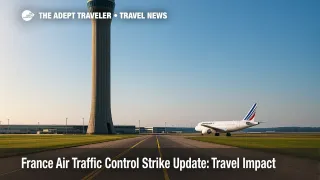France Air Traffic Control Strike Update: Travel Impact

French travelers and over-flight passengers are still feeling the fallout from the two-day France air traffic control strike on July 3-4, 2025. Nearly 1,500 flights were scrubbed, tens of thousands delayed, and average arrival punctuality across Europe fell to 50 percent. Although unions have not filed a fresh walkout notice, talks with the Civil Aviation Authority (DGAC) remain tense, keeping the possibility of more French ATC strikes alive. Travelers heading to, from, or over France should continue to monitor schedules and leave generous buffers for tight connections.
Key Points
- Why it matters: France sits beneath many major European flight paths; one strike jams the entire continent.
- July 3-4 walkout cut up to 50 percent of flights at Paris-area airports and regional hubs.
- Eurocontrol logged 354,000 minutes of network delay; average arrival delay rose to 24 minutes.
- No new strike notice, but UNSA-ICNA warns future action "highly probable" if staffing demands ignored.
- Airlines urge EU to guarantee over-flight rights during national labor disputes.
- EU261 compensation is limited; carriers must still rebook or refund disrupted customers.
Snapshot
DGAC ordered carriers to cancel 25-40 percent of operations at Charles de Gaulle, Orly, and Beauvais on July 3, extending cuts to 50 percent on July 4 as picket lines held. Ryanair axed 400 services, easyJet 274, and Air France trimmed short-haul schedules while protecting long-haul flights. Eurocontrol data show the strike generated more than 354,000 minutes of air-traffic-flow-management delay across Europe, with spill-overs snarling airports in Spain, Italy, and the United Kingdom. Airlines estimate direct losses near €120 million. Ground handling crews struggled with overnight backlogs, forcing some travelers to wait days for reaccommodation despite peak-season load factors.
Background
French air traffic controllers rank among Europe's busiest, managing roughly 3 million commercial flights annually. Unions UNSA-ICNA and USAC-CGT argue that chronic understaffing, aging radar systems, and "toxic management" have pushed safety margins and morale to the brink. Controllers must now cover more sectors per shift than a decade ago, yet hiring remains frozen below replacement rate. A long-promised NextGen-style modernization, 4-Flight, is two years late and over budget. Frustration peaked in June when DGAC proposed a new roster that unions say increases night duties without matching pay. The July strike deliberately targeted the first French school-holiday weekend to maximize leverage. Under French law controllers provide minimum service notice, but over-flights not landing in France still require French clearances, widening the impact.
Latest Developments
Negotiations Stall After July Walkout
DGAC and union leaders met on July 18 but parted after five hours with "no substantive progress," according to UNSA-ICNA. The union insists on a concrete hiring timeline-70 new positions per year for five years-plus a phased radar upgrade budget. DGAC counters that fiscal caps restrict immediate hires and offers seasonal overtime instead. Mediators from the Transport Ministry have scheduled a follow-up session for July 29. Under French labor rules, unions must give at least 48 hours' notice for any fresh strike, but insiders warn a multi-day action in August remains "on the table" if negotiations falter. For a deeper scenario analysis, see Adept Traveler's update.
Airlines Press Brussels for Over-Flight Reform
Airlines for Europe (A4E) and Ryanair's Michael O'Leary renewed calls for EU legislation that would allow neighboring air-navigation providers to handle traffic over France during national strikes. They argue the current patchwork unfairly punishes carriers and passengers who neither depart from nor arrive in France. Brussels officials indicate the proposal will be reviewed in the autumn Single European Sky package, though France traditionally resists ceding sovereignty over its airspace. Industry analysts note similar rules already apply to oceanic airspace and could be adapted for mainland corridors.
Analysis
Labor unrest in French air traffic control is cyclical, but 2025 presents a perfect storm: record post-pandemic demand, strained staffing, and still-delayed technology rollouts. Unlike airline strikes, controller walkouts are felt far beyond national borders because over-flights rely on French centers in Reims, Paris, and Marseille to thread busy routes between the UK, Iberia, Italy, and the Mediterranean. Each hour of restricted capacity forces reroutes adding fuel burn and carbon emissions, undermining carriers' climate pledges. Longer-term solutions require joint EU investment in cross-border ATC virtualization and harmonized labor-dispute minimum-service levels-ideas languishing since 2013. For travelers, risk management is pragmatic: avoid tight connections through France, consider rail on sub-five-hour routes, and purchase "trip interruption" insurance that covers strikes (many basic policies do not). Agencies should pre-emptively rebook clients on early-morning departures; historic data show controllers maintain higher staffing before 9 a.m. local time even during strikes. Airlines, meanwhile, may continue surcharging "France contingency" costs into southern-Europe fares until labor peace returns.
Final Thoughts
With talks still deadlocked, travelers should brace for potential late-summer disruptions and build flexibility into itineraries involving French airspace. Monitoring DGAC advisories, airline alerts, and union notices remains essential. Whether Brussels intervenes or DGAC secures new hiring, the next fortnight will determine if the July shutdown was a one-off or the opening act of a larger France air traffic control strike saga.
Sources
- French air traffic controllers' strike disrupts flights for second day - Reuters
- Impact of the French ATC strike of 3 & 4 July 2025 - Eurocontrol
- Traveling to Europe this summer? - Business Insider
- Airlines Blast 'Intolerable' Two-Day French ATC Strike - Skift
- Hundreds of flights cancelled as French ATC strike hits - Euronews
